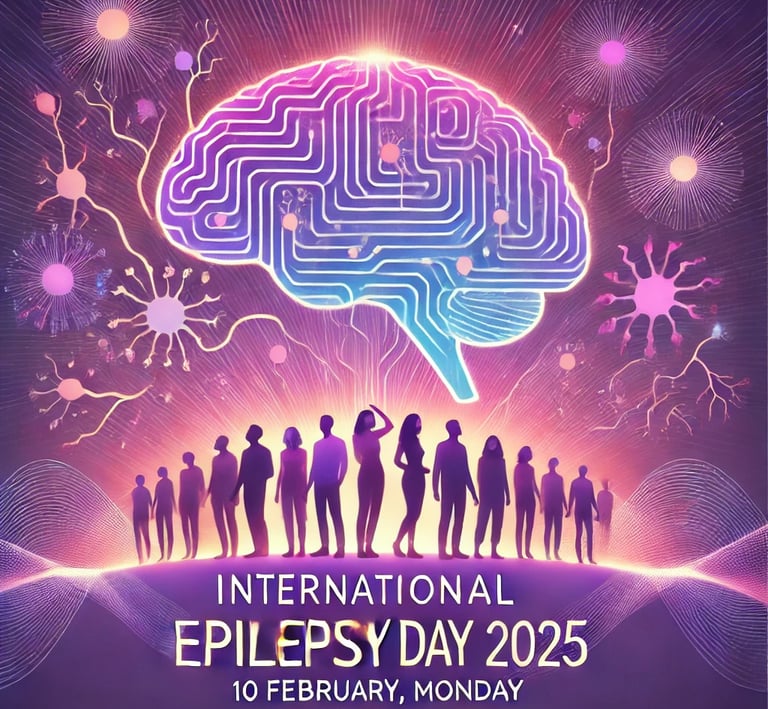International Epilepsy Day 2025 – Raising Awareness, Sharing Journeys By Aferz Herbals | February 10, 2025
International Epilepsy Day 2025: A Global Call for Unity This year, International Epilepsy Day (IED) is observed on February 10th, 2025, a day dedicated to uniting individuals, families, and caregivers affected by epilepsy worldwide. Organized by the International Bureau for Epilepsy (IBE) and the International League Against Epilepsy (ILAE), this day shines a light on the challenges faced by over 50 million people living with epilepsy globally


Introduction
Every year, on the second Monday of February, millions around the world unite for International Epilepsy Day. In 2025, this important day falls on 10 February—a day dedicated to raising awareness about epilepsy, a chronic brain disorder that affects both patients and their caregivers psychologically and emotionally. At Aferz Harbals, we believe that understanding and compassion are key to empowering lives, and today we invite you to learn more about this condition, its challenges, and the treatment options available.
Impact on Patients and Caregivers
Living with epilepsy is a long-term journey. Not only does the condition affect the individual experiencing seizures, but it also has profound psychological and emotional effects on families and caregivers. The unpredictable nature of seizures can lead to anxiety, social isolation, and a constant need for vigilance—factors that significantly affect quality of life. International Epilepsy Day is an opportunity to spotlight these challenges and advocate for better support systems for those affected.
Treatment Options
While epilepsy cannot be cured, a variety of therapies can help manage the condition:
Anti-Epileptic Drugs (AEDs): The cornerstone of epilepsy management, AEDs work by altering brain chemistry to help control seizures. Research shows that up to 70% of individuals with epilepsy can achieve effective seizure control with medication.
Surgery: For patients with drug-resistant epilepsy, surgical interventions—such as resection or focal disconnection—can significantly reduce or even eliminate seizures by targeting the area of the brain where seizures originate.
Neurostimulators: Devices like vagus nerve stimulators (VNS) and deep brain stimulation (DBS) offer alternative options by sending controlled electrical pulses to specific brain areas to reduce seizure frequency.
Dietary Therapy: Diets such as the ketogenic diet or modified Atkins diet can help manage seizures in some patients by altering the brain's energy source.
Lifestyle Modifications: Stress reduction, regular sleep patterns, and avoiding known seizure triggers are important strategies that complement medical treatment.
Research and Future Directions
Ongoing research continues to explore the underlying causes of epilepsy and develop new treatment strategies. Although many individuals manage their condition effectively with current treatments, breakthroughs in areas such as gene therapy, neurostimulation, and advanced dietary interventions offer hope for even better seizure control in the future. Collaborative global efforts, including those led by organizations like the International Bureau for Epilepsy and the International League Against Epilepsy, are paving the way for improved care and quality of life.
Conclusion
International Epilepsy Day 2025 is a reminder that while epilepsy may be a lifelong condition, effective management is within reach. Through medications, surgical options, neurostimulation, and lifestyle adjustments, many people with epilepsy lead fulfilling lives. At Aferz Harbals, we are committed to spreading awareness, supporting holistic health practices, and empowering those affected by epilepsy. Let’s stand together in solidarity on 10 February 2025 and work towards a future where epilepsy is better understood, managed, and ultimately, where every individual’s journey is met with hope and support.
Join the conversation and share your #EpilepsyDay story on social media. Together, we can inspire change and improve lives.
References:
What is Epilepsy?
Epilepsy is a neurological condition characterized by recurrent seizures—sudden bursts of uncontrolled electrical activity in the brain. These seizures can alter a person’s sensations, behavior, awareness, and muscle movements. Although epilepsy cannot be cured, it can be effectively managed with a combination of treatments. Seizures vary widely in their intensity and duration, but for many people, they can be controlled so that epilepsy has little or no impact on daily life.
